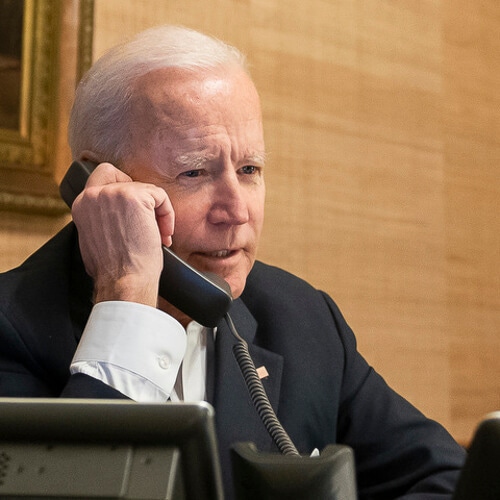TikTok tale ticks to Biden finale, second season
Biden overturns Trump's TikTok and WeChat bans, but his new review on how Chinese companies use US data may see them die another day.

The TikTok policy of waiting out Trump seems, for now, to have worked.
In this season's finale of TikTok's battle with the White House, President Biden has cancelled his predecessor's executive orders banning downloads of TikTok and WeChat.
But in a classic season two set up, Biden has launched a new review by executive order, charging the Commerce Department with making recommendations to protect US users' data.
Figure 1:  Waiting it out: President Joe Biden has cancelled former President Donald Trump's vendetta against TikTok and WeChat for now.
Waiting it out: President Joe Biden has cancelled former President Donald Trump's vendetta against TikTok and WeChat for now.
(Source: White House)
And that review may well provide both suggestions and evidence which TikTok and WeChat lawyers find harder to overturn in court.
With exquisite timing (or trolling), ByteDance-owned TikTok updated its US privacy terms Wednesday saying it "may collect biometric identifiers and biometric information" from users' content, including "faceprints and voiceprints."
A short second season?
Biden's new executive order gives US intelligence and Homeland Security agencies 60 days to make an assessment about the vulnerability and threat of US data being controlled by foreign adversaries.
The Commerce Department, though, will be the review's chief parent, and it will have 120 days to make its recommendations.
Biden, of course, is in Britain this week, attempting to convince the other G7 members to join Washington in putting the screws on China.
The week also holds Nato and EU-US summits in Brussels, followed by Biden meeting Russia's President Putin in Geneva. (Somewhat awkwardly, in March, Biden called Putin "a killer.")
On the table between Biden and EU Commission President Ursula von der Leyen are proposals including joint standards around emerging technologies and policing the Internet.
Others include acting together on supply chain issues which have arisen during COVID-19.
Viewed from many European capitals, though, Washington even under Biden remains too confrontational, and not all will relish being made to choose sides so overtly in a new US-China cold war.
The draft conclusions document for the EU-US summit instead speaks of "similar multi-faceted approaches," rather than a joined-up songsheet.
Each of these approaches will include "elements of cooperation, competition and systemic rivalry."
Xinjiang, Tibet and Hong Kong will fall into the categories of rivalry and competition.
But for European capitals, climate change, COVID-19 and poverty reduction in Africa can involve more cooperation.
Trump and the book of judges
The Trump executive orders from August 2020 never actually took effect.
Two federal district judges in Washington, DC, and a third district judge in Pennsylvania, blocked the TikTok ban between October and December.
Trump overstepped presidential authority in using emergency economic powers to ban the popular video sharing app, they said.
Likewise, Trump's order banning WeChat was promptly blocked by a Northern California court in September.
Federal magistrate judge Laurel Beeler found the order violated the first amendment rights of Chinese-Americans who used the app to communicate with family members in China.
Tough on China, tough on the causes of China
China hawks in the Republican opposition are a big constraint on Biden's ability to strike off in a different China direction to Trump.
Midterm elections in November 2022 will put all 435 seats in the House of Representatives and 34 Senate seats to the voters.
Accusing Biden and the Democrats of softness on China would put the Republicans back on familiar national security terrain. Biden sits on only a 50-54% approval rating in recent polls, in a sharply divided America.
Want to know more about security? Check out our dedicated security channel here on Light Reading.
Withdrawing the articles is "a major mistake," which "shows alarming complacency" about China's access to Americans' personal information, Republican Senator Josh Hawley tweeted.
But given the Trump order never took effect, Biden's long game appears to produce, in his executive order's words, "rigorous, evidence-based analysis" which may – unlike Trump's – actually withstand the scrutiny of judges.
The concrete process is "a bit of a troll to the Trump administration approach," which courts exposed as "a bit of a hollow process," trade lawyer Brian Fleming told the Times.
On this view, Biden may have saved TikTok to have it die another day.
Tune in next season.
Related posts:
— Pádraig Belton, contributing editor special to Light Reading
Read more about:
AsiaAbout the Author(s)
You May Also Like












